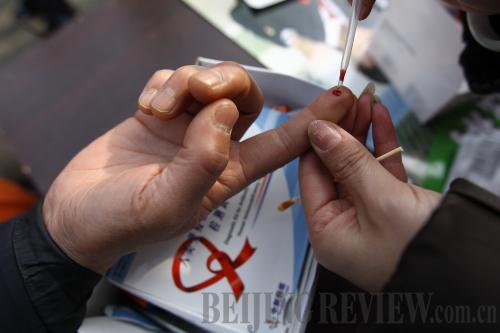|
 |
|
CLEAR AND EASY: A resident of Xiangyang, central China's Hubei Province, gets an HIV test on World AIDS Day on December 1, 2011 (WANG HU) |
According to a 2011 report jointly released by the China Alliance of People Living with HIV/AIDS and the International Labour Organization, apart from fear, clinically unnecessary HIV tests are another reason many people with HIV/AIDS get turned away by hospitals.
Meng Lin, an AIDS sufferer and coordinator with the alliance, said that most hospitals in China require patients to receive an HIV test before surgery so doctors can react in a timely and appropriate manner in case of an emergency during surgery. The safety of medical practitioners is deemed more important than HIV-positive patients' rights to receive surgery.
Some hospitals have been designated to treat HIV/AIDS, which has also become an excuse for other hospitals to turn away HIV-positive patients, according to Meng.
Where to go?
According to a report released by the CCPCP, the estimated number of people with HIV reached 780,000 in China in 2011, but only 343,000 cases had been officially reported. The difference between the estimates and official figures is partly due to reluctance of HIV-positive people to come forward for treatment, the report said.
Sexual contact is the main vector for HIV transmission China. The CCPCP revealed that 46.5 percent of people with HIV in China contracted the virus through heterosexual contact and 17.4 percent through homosexual contact. In addition, infection via intravenous drug use and botched hospital blood transfusions stood at 28.4 percent and 6.6 percent, respectively.
More than 80 percent of HIV-positive people in China live in Yunnan, Guangdong, Sichuan and Guizhou provinces and Guangxi Zhuang and Xinjiang Uygur autonomous regions, according to the report. It also warned that there are still a large number of people with HIV/AIDS unaware of their infection.
"Now each prefectural-level city on the Chinese mainland has at least one designated hospital to carry out anti-retroviral and HIV/AIDS-related treatment," Wu said. "But patients are not willing to go due to the fear of alienation. Besides, the medical conditions in some of these hospitals do not meet the needs of the patients."
"Many such hospitals, particularly those specializing in infectious diseases, are not competent in treating other diseases such as cancer," said Zhao Yan, Wu's deputy.
Meng with the China Alliance of People Living with HIV/AIDS suffered kidney problems as a side effect of anti-retroviral drugs in August.
"I first went to an infectious disease hospital, but it wasn't equipped to treat kidney disease at all," Meng said, adding that he was rejected numerous times while seeking medical services at non-designated hospitals, even in non-surgical cases.
"The public's recognition of people with HIV/AIDS is still negative despite great efforts of related NGOs in spreading the basic knowledge of HIV/AIDS," said Xiao Dong, head of Rainbow Clinic, a free clinic in Beijing offering medical and psychological help for people with HIV/AIDS. "As long as a person is diagnosed with AIDS, many people assume they will die, including family members. Patients like this are more inclined to commit suicide if not properly counseled."
Speaking at a ceremony for a joint Chinese-Australian HIV/AIDS prevention program on November 23, Minister of Health Chen Zhu said that HIV-positive individuals now live much longer and need treatment for other medical conditions associated with immune deficiency. He admitted that hospitals designated to treat HIV/AIDS are not ready for the new environment.
"The Health Ministry will improve services at designated hospitals to better serve people with HIV/AIDS," Chen said. "We'll also improve safety conditions for medical workers."
Email us at: yuanyuan@bjreview.com | 